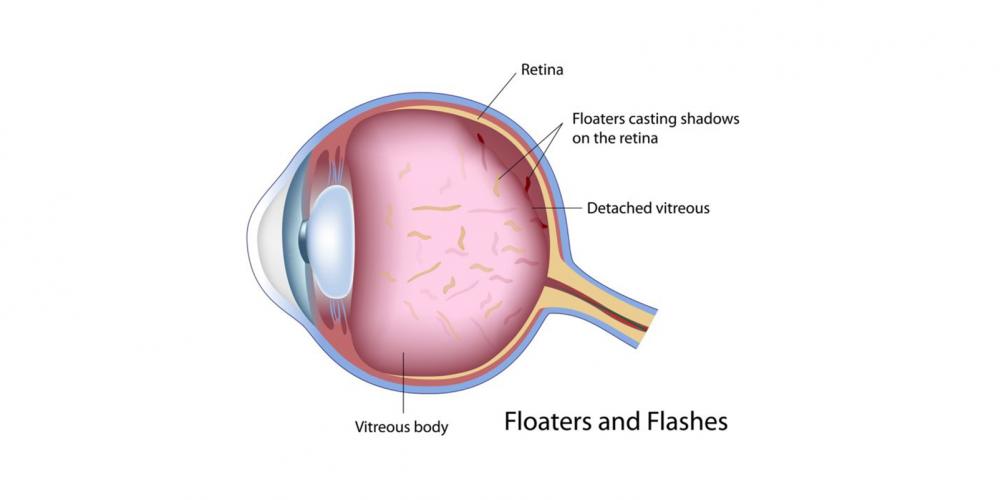
Eye Floaters And Flashes
Most of us, at some point in our lives, will probably experience the mild symptoms eye floaters and flashes. Eye floaters are tiny spots floating around in our vision. These tiny spots are called floaters and are defined as small specks or clouds that drift in the field of vision. Eye floaters can be any shape including tiny dots, circles, cobwebs or clouds and are generally harmless.
Reasons for eye floaters
To understand what causes eye floaters, we need to look at the structure of the eye. The eye is filled with a gel-like liquid called the vitreous humour, which is made primarily of hyaluronic acid. During youth, the vitreous humour has a gel-like consistency, but as we begin to age, it becomes more watery, especially around the middle of the eye, whilst the outer parts begin to get more solid.
The solid parts begin to break down and float within the watery parts of the eye and the images of clouds, circles and cobwebs are actually the reflection of the shadows of these particles onto the retina. These are termed floaters.
These eye floaters also have a tendency to sink to the bottom of the eyeball and can cause a temporary blurring of vision until they move to another area within the eye. In most cases, floaters are simply annoying and are associated with the ageing process and are generally harmless. However, you should see an ophthalmologist if:
- the size, numbers and frequency of floaters increases dramatically.
- you experience sudden flashes in your vision.
- there is a decrease in your vision.
Flashes on the other hand are caused by the degradation of this gel around the retina tugging or pulling in this area causing these lightning streaks or seeing “stars”.
In any of these instances, there may be underlying causes such as eye inflammation, eye disease or a slight detachment of the retina. However for the majority of people suffering with eye floaters, treatment is not necessary and the advice usually given will be to ignore them which is not always the answer one may be seeking.
Natural treatment for eye floaters
Since the majority of cases of floaters are associated with the ageing of our bodies and of the fluids within the eye, I think it is pretty essential to take hyaluronic acid in supplement form to provide a strong therapeutic strength of absorbable hyaluronic acid, such as High Strength Hyaluronic Acid which is beneficial for the eyes as well as joints and skin.
Eye exercises may help to reduce the incidences of floaters. One such exercise is to tilt the head so that it faces the ceiling. Look straight ahead at the ceiling and roll the eyes in a clockwise direction and then counter clockwise for a few seconds. Repeat this exercise five times daily. This exercise enhances circulation to the eyes and in turn helps to nourish the eye tissues.
A healthy and balanced diet rich is green vegetables and protein from oily fish is advisable. Avoid wheat and replace with other grains. It also recommended to reduce dietary intake of vegetables belonging to the night shade family including tomatoes, potatoes, egg plants and green peppers. Most of us are aware that antioxidants protect all the structures within are bodies and according to the AREDS study (Age Related Eye Disorder Study), very specific antioxidants such as selenium and lutein help to protect our vision and other eye disorders including preventing cataracts and macular degeneration. The AREDS 2 study which is ongoing also recommends the inclusion of good strengths of Omega 3 essential fats obtained from fish. One such supplement that combines all the nutrients including Omega 3’s is Nutrof Total and I recommend this whether you are suffering from floaters or simply wish to protect your vision.
I believe that a healthy diet with some forms of eye exercise and the correct supplements may help to stop eye floaters and flashes as well as protecting your vision. Always remember to inform your GP and your optician if you experience floaters or eye flashes.
DISCLAIMER: The views, opinions and information expressed in this article and on Victoriahealth.com Ltd are those of the author(s) in an editorial context. Victoriahealth.com Ltd cannot be held responsible for any errors or for any consequences arising from the use of the information contained in this editorial or anywhere else on the site. Every effort is made by the editorial and content team to see that no inaccurate or misleading information, opinion or statement appear, nor replace or constitute endorsement from medical bodies or trials unless specified. Victoriahealth.com Ltd accept no liability for the consequences of any inaccurate or misleading data, information, opinion or statement. Information on Victoriahealth.com Ltd and in the editorials is provided for informational purposes only and is not intended as a substitute for the advice provided by your physician or other healthcare professional. You should not use the information on this website or in the editorials for diagnosing or treating a health concern or disease, or for the replacement of prescription medication or other treatment.